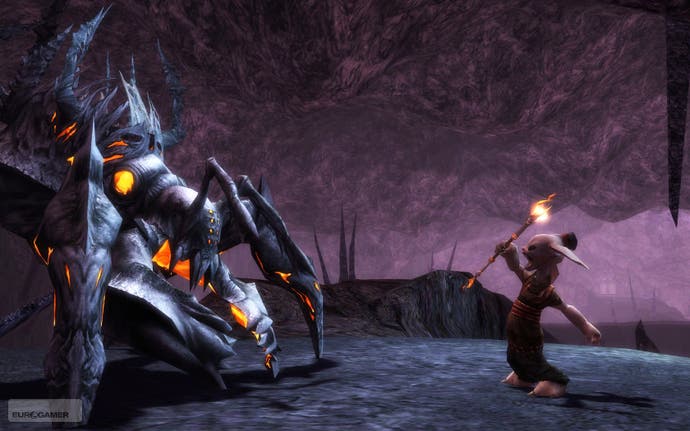Guild Wars
Guilding the lily.
The only fixed thing about a Guild Wars character is their class and appearance; secondary classes, skills and attribute points can be switched around at will, making it impossible to make a decision that has an irrevocable, negative impact on your game. It is easier to experiment with different equipment and techniques than in any other game I've ever played - you can completely change your playing style just by redistributing your Warrior's swordsmanship points and making him a strong, say, necromancer instead - which perhaps explains why so many people are still playing Guild Wars years after they reached the level cap with their first character.
Guild Wars' extremely low level cap (20) has proven to be a stroke of design genius. Because it doesn't take very long to build up a top-level character, a lack of new players is barely even a problem for the community - the game is balanced towards characters with customised equipment and skills, rather than a buffed-up level. As it always has, Guild Wars rewards you for experimenting actively with your character rather than simply pouring endless hours into the number next to its name; for switching around stats and skills intelligently rather than slaughtering rats for hours on end. It's a welcoming system for new players, and it also means that you can come back to the game after years and still have a top-tier character, rather than finding yourself left way behind the curve.
This is the perfect way for a non-subscription MMO to work. Subscribers would be irked to see new players build up top-level characters so quickly, but in Guild Wars players come and go all the time. You can pour in as many hours as you like for that GBP 20 price tag, over as great a timespan as you please. Consequently there's little elitism in the community - long-term players don't have that slightly bitter sense of entitlement that develops when you've been shelling out USD 15 a month for years on end.

The instancing system has also proved prescient, ensuring that it is still possible for players to enjoy every single part of the game that they paid for back in 2005, even if there's no longer anyone else around to join in on a quest. Only town areas are communal - the wilderness outside is generated for your party, and your party alone. In the absence of other real people, you can always adventure with computer-controlled henchmen or, even better, Nightfall's fully-customisable Heroes. It can be played as a single-player RPG, with the storytelling and set-pieces to match, and all the benefits of an MMO's community and constant developer support standing by if and when you feel like joining in with guilds and PVP.
Throughout the past three years, ArenaNet has shown that it cares about what Guild Wars players want: every new GW campaign has brought changes that dedicated players have asked for. The PVP element of the game is now ridiculously rich and complex, encompassing every imaginable tournament variation, and a boisterous and competitive community of guilds, constantly forming alliances to unseat each other. Spectating at these battles is awesome, even if you never plan to take part. In PVP, Guild Wars turns into a strategy game - it's fascinating just to watch how people play classes and skills off against one another, making full use of the game's 56 possible character combinations and limitless skill arrangements.
These are all things that people appreciate about Guild Wars. The things that people really love about it - the ludicrously beautiful characters, the Asian and Grecian influences on the art style and landscapes, the grand-scale theatrical storytelling that occasionally verges on the affected - are more subjective. It's these things that turn Guild Wars from a great-value-for-money diversion into a passion. It is theoretically possible to find it bland that every single male and female player in the game looks like a gorgeous Olympian demigod, or to find the outdoor environments, sumptuous as they are, a little lacking in imagination, but for most people the game's aesthetics are a main attraction.

The downside of Guild Wars' extreme flexibility is a lack of depth. It's combat-obsessed - all you'll ever do in Guild Wars is kill things, albeit in intricate, enjoyable ways - and the very things that make it playable as a single adventurer with henchmen can make it a bit boring for support-class characters. It's not a game that it's worth devoting hours of your life to every single night for years. It's more something to dip in and out of, to revisit once or twice a month, to play obsessively during a week off.
Any of the three campaigns offers a great story, but it's not a virtual life that you feel compelled to come back to. It's excellent, but in MMO terms, it's short-term. It's also not got universal appeal, despite its accessibility - because of it, actually. Instanced questing and flexibility are empowering and refreshing for those who take to Guild Wars, but lonely and lacking in subtlety for those who don't.
Still, even taking that into account, you've got a good few hundred hours of entertainment for GBP 20 if you buy any one campaign, so it feels cheap and irrelevant to accuse the game of being shallow. Undeniably, Guild Wars as it currently stands offers preposterous value for money and is a brilliant example of how a successful a non-subscription MMO can be. It takes its own route rather than aping other games' successes, and over the past three years it has developed into a well-rounded, popular and unique experience for anyone seeking the companionable adventuring, grand storytelling and character role-playing of an MMO without the monthly price-tag, pretentious top-level players, or obligatory grinding that usually go with them.
